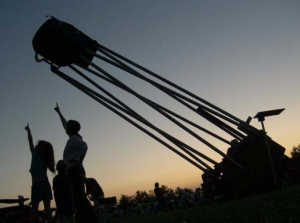The Delta Aquarids is an average shower that can produce up to 20 meteors per hour at its peak. It is produced by debris left behind by comets Marsden and Kracht. The Delta Aquarids is an average shower that can produce up to 20 meteors per hour at its peak. It is produced by debris left behind by comets Marsden and Kracht. The shower runs annually from July 12 to August 23. It peaks this year on the night of July 28 and morning of July 29. The nearly full moon will be a problem this year, blocking out all but the brightest meteors. But if you are patient, you should still be able to catch a few good ones. Best viewing will be from a dark location after midnight. Meteors will radiate from the constellation Aquarius, but can appear anywhere in the sky.

See front page of NOVAC Site for changes to event.
More information about Great Meadow including directions and parking visit the Great Meadow Site page.
Should be AWESOME this year. The Perseids is one of the best meteor showers to observe, producing up to 60 meteors per hour at its peak. It is produced by comet Swift-Tuttle, which was discovered in 1862. The Perseids are famous for producing a large number of bright meteors. The shower runs annually from July 17 to August 24. It peaks this year on the night of August 12 and the morning of August 13. The thin crescent moon will set early in the evening leaving dark skies for what should be an excellent show. Best viewing will be from a dark location after midnight. Meteors will radiate from the constellation Perseus, but can appear anywhere in the sky.

Cloudy skies and a likely thunderstorm or two will make this evening unsuitable for viewing the skies with telescopes and binoculars.
Hoping for clear skies in September and beyond,
R J ‘Tree’ Greenwood
Crockett Park Site Coordinator
Please read the C.M. Crockett Page for park details.

See front page of NOVAC Site for changes to event.
More information about Great Meadow including directions and parking visit the Great Meadow Site page.

For more information on the event and the flyer – http://www.novac.com/wp/outreach/stargaze/

See front page of NOVAC Site for changes to event.
More information about Great Meadow including directions and parking visit the Great Meadow Site page.
The radiant point for the Draconid meteor shower almost coincides with the head of the constellation Draco the Dragon in the northern sky. That’s why the Draconids are best viewed from the Northern Hemisphere. The Draconid shower is a real oddity, in that the radiant point stands highest in the sky as darkness falls. That means that, unlike many meteor showers, more Draconids are likely to fly in the evening hours than in the morning hours after midnight. This shower is usually a sleeper, producing only a handful of languid meteors per hour in most years. But watch out if the Dragon awakes! In rare instances, fiery Draco has been known to spew forth many hundreds of meteors in a single hour. The shower runs annually from October 6-10 and peaks this year on the the night of the 8th. This will be an excellent year to observe the Draconids because there will be no moonlight to spoil the show. Best viewing will be in the early evening from a dark location far away from city lights. Meteors will radiate from the constellation Draco, but can appear anywhere in the sky.
This shower runs annually from October 2 to November 7. It peaks this year on the night of October 21 and the morning of October 22. The Orionids are meteors left behind in the wake of Halley’s Comet. The nearly full moon will block some of the fainter meteors this year, but the Orionids tend to be fairly bright so it could still be a good show. Best viewing will be from a dark location after midnight. Meteors will radiate from the constellation Orion, but can appear anywhere in the sky.


